- Home
- Barry Lyga
Game Page 10
Game Read online
Page 10
“I said open the goddamn door. Do it now or we’ll bust it down. Seriously.”
“Do you have a warrant?”
Long blew out an annoyed breath. “Okay, we’re knocking it down.”
“Wait, wait.” Connie had stopped moving around. Jazz unchained the door and stepped back. “Come in. What can I do for—”
“You can come with us,” Long said as he and the other two cops came into the room. Long looked around, spied Connie, who was in bed, the covers pulled up to her chin. The detective raised an eyebrow. “You guys,” he directed the uniforms, “check the room and the girl. Dent, put on some pants. You’re coming with me.”
“What’s going on here?” Jazz asked.
Long looked at his watch. “You have thirty seconds to put on real clothes. Dressed or not, I’m taking you with me.”
Bristling, Jazz grabbed his clothes from the previous day and retreated to the bathroom to change. Outside, he could hear the cops going through the dresser and desk drawers. One of them must have started to go through Connie’s suitcase because he heard her shout, “Hands off the panties, you perv!”
He emerged from the bathroom, dressed, to find one of the cops triumphantly brandishing the iPad and papers Hughes had brought over the day before. From the crestfallen expression on Connie’s face, Jazz realized that she had hidden them in her suitcase while he’d stalled at the door.
“We’re done here,” Long said, and tipped an imaginary hat to Connie. “Ma’am,” he fake-drawled, and grabbed Jazz by the arm and led him out the door.
Connie handled the cops dragging Jazz away with an aplomb that both surprised and impressed her. Good for you, she thought. You totally didn’t do the whole shrieking girlfriend thing while they hauled your boyfriend out of here. That would have been pretty low-class.
Then again, Jazz had a history of being dragged away by the cops, and it always worked out. He had been arrested once a couple of months ago during the Impressionist case, at the same time that Howie struggled for his life after being knifed. And she had been there in the school auditorium when Deputy Erickson had pulled Jazz out of play rehearsal one afternoon, all because Jazz had done too good a job predicting the Impressionist’s next victim. Both times, he had returned safe and sound.
As she did at home every morning in her own room, she switched on the TV to listen to the news and weather while she got dressed. She would have to figure out where he’d gone, of course. Even though he always came back to her, that didn’t mean he didn’t need help. After all, the Impressionist had managed to hold Jazz hostage in his own home, and only Connie and Howie’s last-minute heroics had saved him.
Or had they? Maybe Jazz could have saved himself. Put that one up there on the list of things she would never know. She sighed. You could have chosen an easier life for yourself, Conscience Hall, than falling in love with a guy who packs the kind of baggage Jazz packs.
Nah. She was kidding herself. It hadn’t been a choice—she had fallen desperately in love with Jazz early on. Tried to hide it. From her father especially, but even from herself. In love with the son of the world’s most notorious serial killer? For reals? Maybe he’s not nuts, but you sure are, Connie!
The first time they kissed, though…
God, that first kiss!
Connie’s driveway. Evening bleeding into an unusually cool summer night. She was sixteen at the time and he wasn’t the first boy she’d kissed, but he was the first one to make her feel cold and warm all at once, the first one to make her want to dissolve into him.
He’d groaned somewhere deep in the back of his throat as they kissed, and she thought that groan was surrender.
And speaking of surrender, she thought, pawing through her suitcase for a shirt, what the hell happened last night? A less confident girl might have curled up in a corner with her Cosmo and wept and snuffled her way through some idiotic article with a title like “How to Make Him Your Boy Toy.” But not Connie. She wasn’t self-centered, but she also wasn’t blind. She knew she had it going on and that there were basically only two good excuses for a guy not wanting to take advantage of her willingness: gay or dead.
She checked herself in the mirror. Not that it mattered. She would be bundled in a heavy coat when she went outside. And she didn’t know anyone in Brooklyn, anyway.
Mirror Connie looked pretty damn good. She pouted, then puckered up and blew herself a kiss. And then felt like a stupid little girl.
Had she been unfair to Jazz the night before? Was she still being unfair to him? He’d made it pretty clear that he wasn’t ready for the big step to Real Sex. What kind of girlfriend was she if she couldn’t understand and respect that?
Then again… maybe he was the one being unfair to her. All kinds of people had traumas in their pasts. Not all of them were completely unable to connect with other people. And Jazz had proven many, many times in the past that he had no problem making out—they’d kissed, touched, probed, and groped each other in every way imaginable. He had drawn a line he refused to cross for no good reason and she was on the other side of that line, begging him to cross over.
Why couldn’t he—
And just then, the TV, burbling in the background, said her boyfriend’s name.
Connie spun around, reaching for the remote so that she could turn up the volume.
“—son of Billy Dent,” a very, very blow-dried anchorman said. “Needless to say, this news comes as something of a shock to New Yorkers, prompting questions as to the possible involvement of Billy Dent in the Hat-Dog murders.”
You moron. Hat-Dog’s been killing since before Billy broke out of jail.
“In the meantime, police sources tell WPIX that Jasper Dent will be arriving at the Seventy-sixth Precinct in Carroll Gardens soon to discuss the case. We expect a press conference with task-force commander Captain Niles Montgomery later today to brief us. We’ll have details of that press conference on our website, of course, along with a wrap-up and commentary tonight at five.”
Connie turned off the TV—news anchors had a bizarre, sing-song way of talking, a constant up-and-down of weird word emphasis that nauseated her. She could only take it for roughly the length of time it took her to get dressed each morning.
So, Jazz was safe. With the NYPD. As usual, no one could be bothered to fill her in, and she figured she wouldn’t hear from him until he was done. Odds were it would take him all day. What should she do in the meantime?
Come on, Connie. You’re in the coolest city in the world for the day.
Just then, her cell phone burbled for her attention. It was her father.
“Hi, Daddy!” she chirped, making every effort to sound like a girl who had not skipped off to New York with her boyfriend and lied about it to her parents. The only problem was that Connie didn’t know what that girl would sound like.
“Something you’d like to tell me?” her father asked without preamble or greeting. That was how her father operated: He always gave his kids an opportunity to come clean. Connie had never noticed a difference in the punishment, though, so she usually gambled on trying to get away with it.
“New York is amazing,” Connie effused, trying for “breathless and overwhelmed.” “Last night we went to Rockefeller Center, which is so much cooler than on TV—”
“I was reading the paper today, and guess what it says?”
“Well,” Connie said, “I bet it doesn’t say anything about the awesome Chinese food I had for dinner last night.”
“It says that Jasper is in New York. Right now.”
Ouch. Of course. That made sense. The news probably leaked from Lobo’s Nod to New York, not the other way around. “Really?” She aimed for surprised, but came closer to “oh, busted.” Cleared her throat for a second try. “Really? That’s a weird coincidence.”
“I’m sure,” her father said drily. “And right now, you’re where?”
“At Larissa’s place.”
“Let me talk to her, then.”
Double ouch.
“She’s in the shower.”
“I can wait.”
“Dad…”
“Seriously. I have all kinds of rollover minutes. I can wait.”
Damn.
“Okay, Dad. I’m not with Larissa. I’m at a hotel in Brooklyn.”
“With him.” Her father’s anger was palpable, even over the phone.
“No. I’m not with him. Honest.” It wasn’t a lie. Present tense was your friend when it came to lying.
“Do you really think I’m going to believe anything you tell me? This isn’t like you got caught doing something and lied to avoid punishment, Conscience. This was premeditated. You set this up. You set me up. You planned this and then you executed your plan, a plan based on deception and dishonesty. So explain to me why I should believe anything you say. Go on. Explain.”
“Because I’m telling the truth. He’s not here. He’s with the police.”
“That’s where he belongs.”
Connie considered explaining that Jazz wasn’t under arrest—not really—but figured she’d just let it go. “Dad, the whole reason we’re here—”
“The paper says—”
“It’s Doug Weathers, Dad. Jesus, you can’t believe anything that guy—”
“Do not take the Lord’s name in vain, Conscience. You’re in enough trouble with me as it is already. And I don’t care why you’re there. What I care about is this: My child lied to me, deceived me, in order to run away with her boyfriend. That’s what I care about. I want you home five minutes ago, do you understand?”
“I can’t—I have a plane ticket. I won’t be home for—”
“Give me your confirmation number. I’ll call the airline and see about getting it changed.”
“But, Dad—”
“What? What are you going to say? Are you going to tell me that this is unfair? That I’m inconveniencing you? That you can be trusted to handle this yourself?”
She’d been planning on saying pretty much all of that.
“Well, let me tell you something.” The rage in her father’s voice had grown more and more potent as he spoke, as though each word stoked a fire in his heart. “Let me tell you something: Fairness is for people who don’t lie. Convenience is for people who don’t lie. And trust is sure as hell for people who don’t lie.”
Connie dropped onto the bed Jazz had slept in. “I’m seventeen,” she said quietly. “You can’t control me for—”
“I can control you for five more months. And if it means protecting you from the world and that boy and yourself, I will damn sure control you right up to midnight on your birthday. Do you understand?”
She turned to her left. Cheek to Jazz’s pillow. She could smell him. Not his deodorant or his shampoo—him. The pure, unadulterated scent of him.
“I love him, Daddy.” The simple, unvarnished truth.
“I’m sure it doesn’t surprise you to hear that I. Don’t. Care.”
There was nothing else she could do. Her father wouldn’t be persuaded by logic and he wouldn’t be persuaded by love. At least she’d tried.
Connie surrendered. She gave her father the confirmation number.
CHAPTER 17
In a depressingly short amount of time, Connie’s father called back to let her know that he had managed to get her a seat on a flight out of LaGuardia late that night. It had cost him $150 more than the cost of the original ticket, a sum he made sure she understood would be deducted piecemeal from her future allowances and summer jobs until paid back.
An hour went by, and Jazz still wasn’t back from the police station, though he did text to say nothing more helpful than that he thought he would be a while. Connie had hours to kill and nothing to do. She couldn’t stand the idea of being cooped up in the hotel room all day by herself, with only the TV and its pathetic selection of cable channels for company. Even through the grayish window, Brooklyn looked hard and bright in the winter sunshine. Despite the bundled pedestrians, she could hardly believe it was cold out at all, so warm was the sunlight.
The police had confiscated all of the materials Detective Hughes had brought the day before, but they hadn’t taken anything actually belonging to Jazz or Connie. Just stuff that had NYPD markings or logos on it.
Which meant that they’d left Connie’s laptop.
The police didn’t know that the previous night, Connie had taken pictures of much of the evidence and then transferred the photos to her laptop, along with notes she’d taken while listening to Jazz and Hughes. She hadn’t minded pretending to play secretary as long as she got something out of it. She was pretty sure even Jazz and Hughes weren’t aware of what she’d been doing. The two of them had been off in some kind of grim, downbeat type of Narnia reserved for those obsessed with crime, an alternate reality where shadows concealed murderers and the sewers clogged with unreadable clues.
She skimmed through the images and notes, then double-checked some things on the maps app on her cell phone. Sure enough, many of the crime scenes were nearby—within walking distance, even.
Connie told herself that she was just going to get out of the hotel room. Get some fresh air. Wander the streets a little and see whatever it was Brooklyn had to offer. She had been to New York before, but always with her family and always to Manhattan, never Brooklyn.
If her perambulations took her to some of the closest crime scenes, well… that was just a happy coincidence, right?
A man pushing a baby carriage nearly collided with Connie on the sidewalk, swerving at the last minute. He wore a wide smile and hilariously awful facial hair and the same heavy-framed retro-hipster glasses as half the guys she’d seen. He seemed so obliviously happy that she didn’t even feel the need to shout, “Watch where you’re going!” after him as he trundled down the street with the carriage. Instead, she just took a moment to look around her, taking in the city.
Connie liked the city, at least what she’d seen of it so far on her impromptu tour of old crime scenes. She had spent some time in Charlotte before her family moved to Lobo’s Nod, but even a big city like Charlotte had nothing on the Big City of Big Cities: NYC. She liked seeing black faces as she strolled the streets, liked not feeling as alone as she sometimes did in Lobo’s Nod, where she often felt conspicuous for more than just the infamy of her boyfriend’s father. Here in New York, she was one more tile in a mosaic of black, white, yellow, brown…. It was exhilarating.
She had always imagined herself here. Here or in LA. If she was going to be an actress, it would have to be one or the other. LA was where you went for the big money and the kind of fame that required bodyguards and came with hot-and-cold-running stalkerazzi: Hollywood. The movies. Endless and eternal.
But New York was home of the stage. Broadway. Performing night after night in front of a live audience. That immediate reaction, that visceral feedback, as relentless and reliable as a tide. She’d first tasted it during a talent show in first grade and she’d hungered for it ever since. While Jazz sought refuge in hideouts and shadows, craving anonymity, Connie longed for the stage, the screen, for everyone in the world to know her face and her name.
Would that keep them together? Would it drive them apart? “We go together ’cause opposites attract,” the old song said, and Connie couldn’t think of two people more opposite than Jazz and herself.
She paused outside a hair boutique that advertised PRODUCTS FOR AFRICAN HAIR in enormous letters in its front window. A woman in a dashiki with braids longer and more impressive than Connie’s stood outside, huddled against the cold, but clearly willing to suffer it for her cigarette.
Just seeing the words African hair in a window made Connie feel warmer. It was the sixth or seventh such shop she’d seen along this stretch of busily trafficked road. The hair salons back in Lobo’s Nod had done the best they could with her hair, but she couldn’t expect much from them. She had eventually turned to her mother for braiding and general hair care, and thanks to the Internet she could hav
e braid spray and detangler delivered, but to live in a neighborhood where dozens of shops catered to her needs? Where she could roll out of bed and walk down the street for balm or relaxer? Have her hair cut and styled by someone who looked like her, someone who knew what it was like to have this hair?
“Can I help you?” the woman asked suddenly. “I’ll just be a second.” She gestured with the cigarette and her expression said, C’mon, kid—don’t make me put this out even a second early.
Connie gazed longingly into the window of the boutique. She could probably spend hours in there, but she had a mission.
“Actually…” she said, and launched into the cover story she’d concocted for herself when prowling around the other crime scenes: She was a high school student writing a paper about the reliability of eyewitness testimony over time. “So, anyway, there was one of the Hat-Dog murders over that way….” She pointed toward the alley less than a block from where they stood. “I was just wondering, Miss—”
“Just call me Rabia.”
“Great. I’m Connie.” They shook hands.
“Who’s Puerto Rican? Mom or Dad?” That caught her off guard for a second. Back in the Nod, almost everyone assumed Connie was short for Constance. She’d never been hit with Consuela before.
“It’s actually Conscience.”
Rabia smiled. “Nice. Who does your hair, honey? It’s not bad, but let me fix you up with some extensions and—”
“I really sort of need to work on the report….” Connie said, biting her lower lip as if she regretted having to interrupt.
“Oh, yeah, that night,” Rabia said. “I remember that.” She dragged on the cigarette with practiced, sensual ease. Her fingernails—visible through the ends of her fingerless gloves—had the hard yellow cast of a serious nicotine fiend. Connie could only imagine what her lungs looked like. “The cops already asked me about it.” She sniffed and snorted smoke out through her nose, waiting expectantly as though for applause.

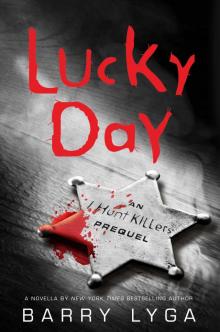 Lucky Day
Lucky Day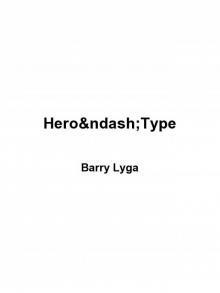 Hero-Type
Hero-Type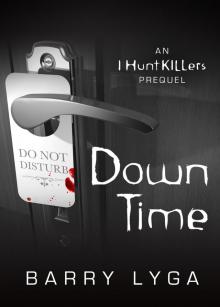 Down Time
Down Time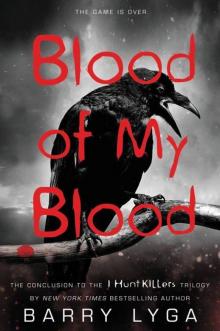 Blood of My Blood
Blood of My Blood Goth Girl Rising
Goth Girl Rising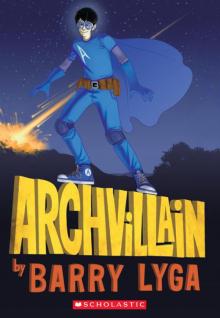 Archvillain
Archvillain Boy Toy
Boy Toy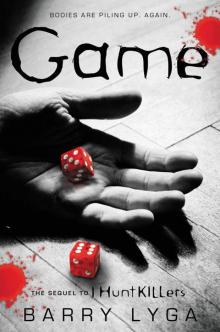 Game
Game Bang
Bang The Legends of Forever
The Legends of Forever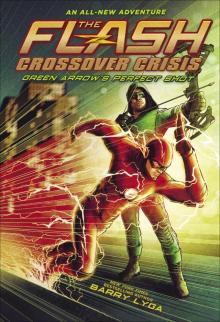 The Flash: Green Arrow's Perfect Shot
The Flash: Green Arrow's Perfect Shot The Flash: The Tornado Twins
The Flash: The Tornado Twins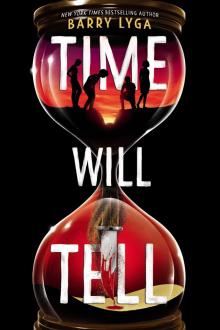 Time Will Tell
Time Will Tell The Secret Sea
The Secret Sea The Hive
The Hive Career Day
Career Day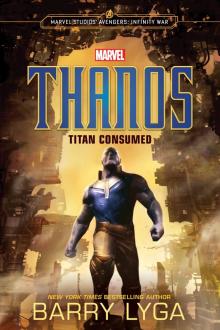 MARVEL's Avengers: Infinity War: Thanos
MARVEL's Avengers: Infinity War: Thanos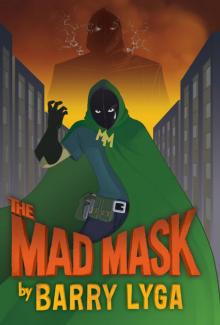 The Mad Mask
The Mad Mask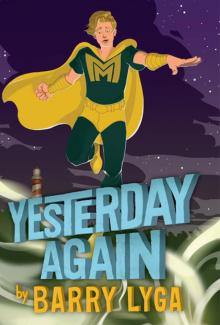 Yesterday Again
Yesterday Again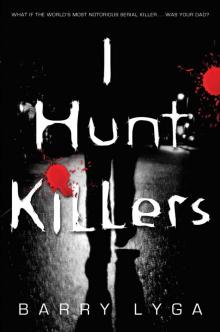 I Hunt Killers
I Hunt Killers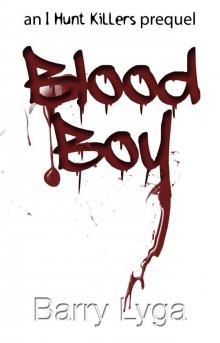 Blood Boy
Blood Boy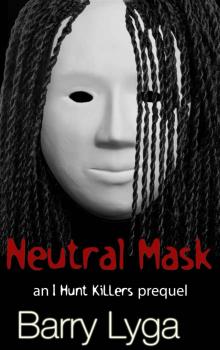 Neutral Mask
Neutral Mask The Astonishing Adventures of Fanboy and Goth Girl
The Astonishing Adventures of Fanboy and Goth Girl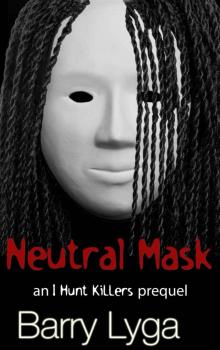 I Hunt Killers Neutral Mask
I Hunt Killers Neutral Mask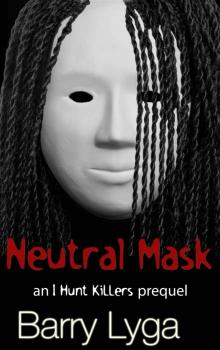 Neutral Mask: an I Hunt Killers prequel
Neutral Mask: an I Hunt Killers prequel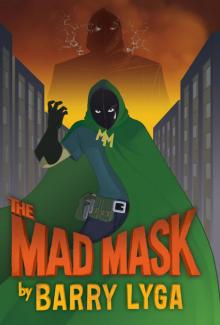 Mad Mask
Mad Mask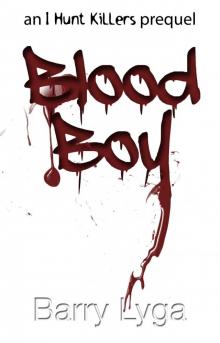 Blood Boy: an I Hunt Killers prequel
Blood Boy: an I Hunt Killers prequel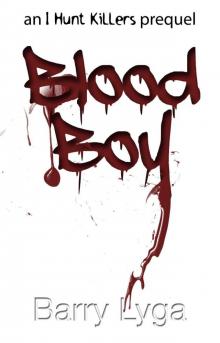 I Hunt Killers Blood Boy
I Hunt Killers Blood Boy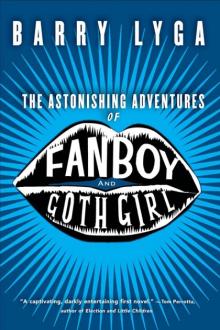 The Astonishing Adventures of Fan Boy and Goth Girl
The Astonishing Adventures of Fan Boy and Goth Girl